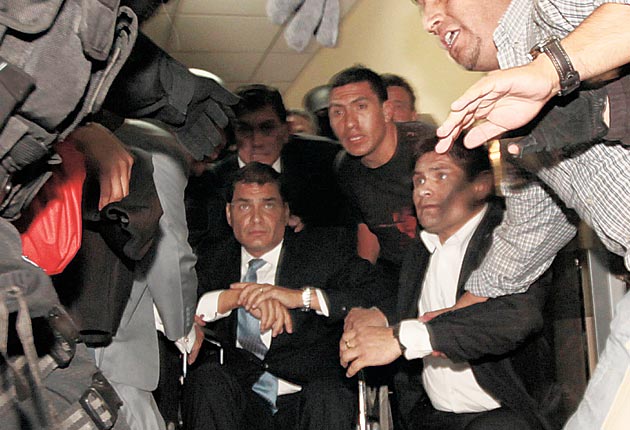Your support helps us to tell the story
From reproductive rights to climate change to Big Tech, The Independent is on the ground when the story is developing. Whether it's investigating the financials of Elon Musk's pro-Trump PAC or producing our latest documentary, 'The A Word', which shines a light on the American women fighting for reproductive rights, we know how important it is to parse out the facts from the messaging.
At such a critical moment in US history, we need reporters on the ground. Your donation allows us to keep sending journalists to speak to both sides of the story.
The Independent is trusted by Americans across the entire political spectrum. And unlike many other quality news outlets, we choose not to lock Americans out of our reporting and analysis with paywalls. We believe quality journalism should be available to everyone, paid for by those who can afford it.
Your support makes all the difference.The President of Ecuador, Rafael Correa, promised yesterday that there would be "no pardon or forgiveness" for the policemen who threw the country into chaos on Thursday when they roughed him up and then held him captive inside a hospital in the capital city, Quito, for more than 12 hours.
Calling the siege an "attempt at a coup d'état" masterminded by opposition politicians who "wanted deaths" and "wanted blood", the left-wing president declared a state of emergency and put the army on the streets to maintain law and order. Last night, the atmosphere was described as tense but stable.
Mr Correa remains at Quito's Carondelet Presidential Palace, where he was taken late on Thursday by loyalist soldiers who broke through police barricades around the hospital where he was imprisoned. Two policemen were killed and dozens more injured during the rescue.
The rest of Ecuador was gradually returning to normal. Its borders and airports re-opened along with major roads, which had been blocked by disaffected policemen upset by austerity measures which would cut pay and bonuses and make promotion harder.
Mr Correa, 47, was attacked on Thursday morning, when he went to the police force's main barracks in the north of the capital to speak with protesting officers. Shortly after arriving, he began being pushed and shoved. Several tear gas canisters were then thrown at his entourage.
At one point in the ensuing drama, he gave an emotional speech in which he tore off his shirt and announced: "If you want to kill the President, here he is. Kill him, if you want to! Kill him if you are brave enough!" Moments later, Mr Correa inhaled a cloud of tear gas and appeared to collapse.
At the nearby hospital, where he was treated for asphyxiation, he gave a series of dramatic telephone interviews, saying that armed police had surrounded the building and were holding him hostage. In one, he vowed to leave as "either a President of a worthy country, or a corpse".
News of the siege ground the country to a halt and led to looting in major cities as criminals exploited the absence of police. Leaders of other countries in the region convened a hasty conference in Buenos Aires where they issued a resolution, saying they "energetically condemn the attempted coup and subsequent kidnapping."
True to form, Veneuzela's left-wing President, Hugo Chavez, and his Bolivian ally Evo Morales claimed the police rebellion had been somehow backed by the United States. Hillary Clinton, the US Secretary of State, swiftly responded on Thursday afternoon with a statement saying the administration "deplores violence and lawlessness" and "fully supports" Mr Correa.
Shortly afterwards, TV news cameras showed dramatic footage of soldiers storming the hospital and driving the President to safety in an SUV. One of the troops, wearing a flak jacket, appeared to be struck by a bullet during the raid, and rolled down an embankment.
Despite its eventual failure, Thursday's revolt has left Mr Correa in a tricky position as it has raised doubts over the stability of the country, which went through eight presidents – many of them installed after coups, nationwide strikes, or other protests – in the decade before he took office in 2006.
Since achieving power, Mr Correa, an economist educated in the US, has followed an agenda broadly similar to other leftist leaders in the region, increasing state control of the oil industry and other natural resources, increasing welfare, and altering the constitution to make it easier for him to remain in office.
However, a string of corruption scandals and deteriorating public finances have left the President facing increased criticism in the nation's largely right-leaning press, and his approval ratings have slumped in recent months as a result of his efforts to reduce federal bureaucracy.
* Police commander Freddy Martinez resigned yesterday saying, "A commander shown such lack of respect by his subordinates cannot stay in charge." Television station Ecuavisa said three senior police officers were detained.
Police officers began to return to work yesterday, a new police chief was named and three days of mourning was declared.

Join our commenting forum
Join thought-provoking conversations, follow other Independent readers and see their replies
Comments